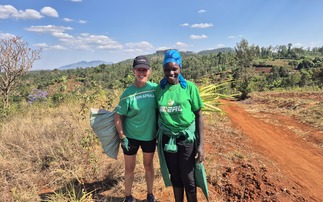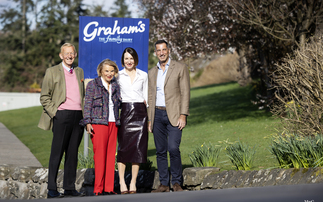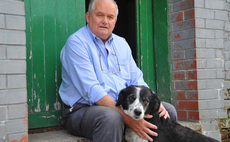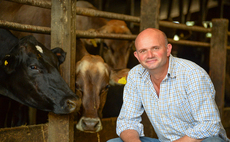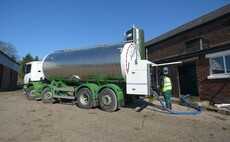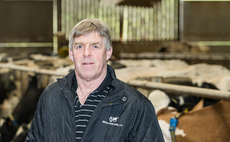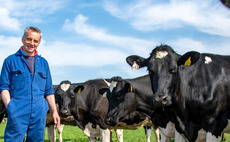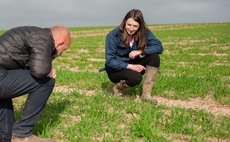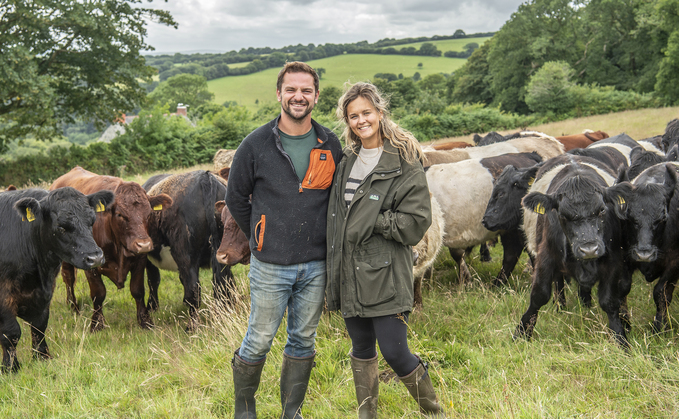
Ben and Claudia Thomas. Ben features in Six Inches of Soil
There has been much talk about the film, Six Inches of Soil, within the farming community. With many discussing the topic of regenerative farming and the future of the sector, the film directly highlights those at the helm of the ‘regen' movement and its place in agriculture.
- To be in with the chance of winning a copy of the book, ENTER HERE
Enter our prize draw by completing the form below and you could be in with a chance of winning a copy of Six Inches of Soil
What is the film about?
Six Inches of Soil tells the inspiring story of young, British farmers standing up against the industrial food system and transforming the way they produce food, in order to heal the soil, our health and provide for local communities.
Half the food we eat in the UK is produced by about 180,000 farmers, who manage 70 per cent of our land. Current ‘industrial' mainstream farming practices significantly contribute to soil degradation, biodiversity loss and climate change. Regenerative farming practices, (within an agroecological system) promote healthier soils, provide healthier, affordable food, restore biodiversity and sequester carbon.
The film is a story of three new farmers on the first year of their regenerative journey to heal the soil and help transform the food system - Anna Jackson, an eleventh-generation Lincolnshire arable and sheep farmer; Adrienne Gordon, a Cambridgeshire small-scale vegetable farmer; and Ben Thomas, who rears pasture fed beef cattle in Cornwall.
As the trio of young farmers strive to adopt regenerative practices and create viable businesses, they meet seasoned mentors who help them on their journey. They are joined by other experts providing wisdom and solutions from a growing movement of people who are dedicated to changing the trajectory for food, farming and the planet.
What is the film's main message?
That we can produce food in harmony with nature through regenerative farming (within an agroecological system). The aims for the film are:
- Reveal the magic and importance of healthy soils
- Give a voice to young British farmers
- Promote familiarity with agroecology, regenerative and organic farming
- Explore the barriers and opportunities for change at an individual level and a system level
- Show how we can build regenerative food markets in the UK
- Promote policy change that connects food with farming, the environment, local economies and public health
- Explore how we can rediscover our regenerative nature
What does the term regenerative farming mean to you?
For me it is a circular system of holistic regeneration that always starts with the soil. By feeding and regenerating soil, we can ensure ecosystems are working together and supporting each other so that in turn, they can support healthy plants, which supports those who are managing the plants, the farmers and the growers. Healthy crops feed and regenerate people, building new routes to market, thereby regenerating the food system. It is more complicated in reality but, the key is to create a resilient farming system. What we have seen through making this film is the regeneration of the person; we have seen farmers who have spent years farming with chemicals who are turning towards learning biological processes and working with nature. That is a wonderful addition to the description of regenerative farming, when the farmer has regenerated themselves, their business, family and community.
READ ALSO: Resilience key for Soil Farmer of the Year 2023
What was the process of filming?
Since 2021, Colin Ramsay, the director of the film, and I have built an awesome team, who have given much of their time and expertise for free. The production office is in Cambridge but we have team members all over the country. We have a fantastic level of support and engagement from our 11 NGO partners who include Nature Friendly Farming Network and FarmEd. These organisations and farmers are working hard to create a more resilient and diverse farming system. They have encouraged us to make the film and we have remained independent so we can produce a film that pushes for change. We are now working with our partners to develop our impact and educational campaign that is part of the distribution of the film.
As an independent production we have raised funds via two successful Crowdfunders, generous private donors, trusts, foundations and ethical companies. These funds enabled us to hire a professional film crew to create the film. We shot over 120 hours of footage over one year, visiting farms from Cornwall up to Cumbria and filming in all weather. It is a film about farming, so we needed to capture each season and all the hard work involved in growing and producing food.
Who is the film's audience?
We believe that people up and down the country of all ages will enjoy the film and will take something positive from it, even if they do not havea farming background. We want to empower young, British farmers and to give them a voice and the confidence to farm in a regenerative way. The climate emergency is at the top of most people's agendas and regenerative farming can really make a difference. We want to get the public and the policymakers on side and to get farming the long term investment that it needs.
READ ALSO: Better soil, better farming? Easy steps to start your journey to better soil on farm
What encouraged you to make it?
For me, initially, I was inspired after moving to live in an arable area for the first time and wanted to know what was going on in the fields outside my house. I have always had an interest in agriculture and my grandfather was a farmer. I care about the provenance of food so I wanted to deepen my understanding of regenerative and nature-friendly farming. I joined Carbon Neutral Cambridge and together we wanted to raise awareness of how agriculture and climate change interlink, so we decided to make a film.
That is when I met a local filmmaker, Colin Ramsay, and together we made a short film ‘From the Ground Up'. It was about changes happening within agriculture in Cambridgeshire and it featured five farmers who are regenerating their soil and their communities. This film inspired us to make Six Inches of Soil.
Did you learn anything about farming that surprised you throughout the process?
Farmers are required to do so much; they have to read the weather, they have to be chemists (if they are using chemicals), biologists, physicists, then they have to be business people and accountants. They have to know how to sell the product, perhaps market it. It is such a multifaceted job. On the regenerative side, we have seen how farmers are working closely together, they are not just looking over the hedge and pointing fingers or working alone and feeling lonely. They are learning together and that is really been a pleasant and wonderful surprise, particularly when you go to events like Groundswell and you hear about farm clusters forming. Also, I think the perception of farmers is that they can be a bit gruff and distant, but that is because they are so busy and they are being dictated to the whole time. I gain more and more respect for them and the industry as a whole and I hope we can create a system that can have long term benefits for everyone.
How can it be watched?
We had our first global screening at COP28 in December 2023 and our first UK screening at the Oxford Real Farming Conference. We re now in the middle of six sold-out preview screenings at very special venues to thank key partners and supporters. We recently announced a Picturehouse tour as part of their Green Screen, across 13 cinema venues with a live panel conversation following the film. The tour begins on Tuesday, March 19, with a red-carpet gala event at Cambridge Arts. It will then visit Picturehouse Cinemas in Crouch End, London, Norwich, Brighton, Bath, Henley, Exeter, Liverpool, Chester, Oxford, Edinburgh, York and Ealing London.
In March, we also begin our UK wide programme of community screenings that will run throughout this year. We already have screenings booked in from the North of Scotland down to Britain's most southerly farm in Cornwall. These screenings will have panels, Q&A sessions and celebrate local food that is hopefully regeneratively grown. From our extensive research we found that a community screening programme can have more of an impact and lead to action being taken by the audience - that is why it is at the heart of our distribution plan.
By early summer the film should be made available via either an online streaming service, or via a video on demand service. It's being shown to distributors at present, who will be sharing it widely to the largest streaming services on the market. We hope that despite the film being made available online the roadshow will continue in towns and cities on farms and in board rooms.
If you are a farmer or in agriculture and would like to find out more about regenerative farming, do you have any advice?
With the help of our partners, we have created an online resource so people can dig deeper into regenerative farming, healthy soil, the food system, climate and nature. Our vision for the film and impact campaign is to inspire farmers with the confidence and practical knowhow to adopt regenerative farming approaches; to give consumers the impetus and the information to rethink their food choices, and ultimately create a groundswell of public opinion leading to policy change, support and funding for a British regenerative farming and agroecological revolution. We have founded a not-for-profit company, Springtail Productions CIC, to enable us to raise funds to distribute the film and maximise its impact.













